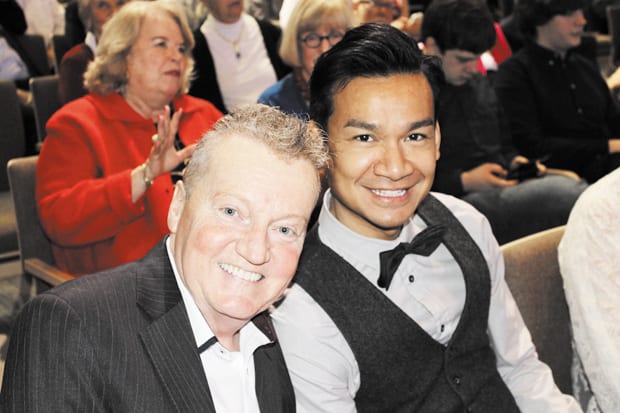Growing older presents singular challenges that LGBT community members seek to address
DAVID TAFFET | Senior Staff Writer
In the 1980s, the gay community was suddenly hit by the AIDS epidemic, and the community rallied to provide care and services to the ever-growing number of people getting sick and dying quickly. Many of those newly-formed organizations based their model of care on mainstream services provided for the elderly.
Today, the picture of the LGBT community is quite different. AIDS has become a manageable chronic illness, rather than a death sentence. And the community is making amazing headway toward equality.
But a new crisis is looming. As baby boomers approach retirement age, the LGBT community is facing a silver tsunami.
Cannon Flowers has been concerned about this problem for a number of years and has been quietly looking for support from inside and outside the LGBT community.
In February, he attended a conference at the White House on LGBT aging, and Flowers is the main organizer of an LGBT Aging Summit set for June in Dallas. The summit will be open to community members and allies of all ages at Senior Source on Harry Hines Boulevard.
Flowers worries that a large number of gays and lesbians are facing old age alone. Many never had children and some are alienated from their families, he explained.
The aging summit will address these problems and is looking for a number of solutions.
Bart Poche, a researcher at the Center for Psychosocial Health Research at the University of North Texas and project manager for the center’s aging LGBT study, will present at the summit.
He said his study is looking for quality of life issues. Research into the aging LGBT population is a fairly new field, although UNT’s psychology department has been doing research for more than four years.
“We expect to find things we don’t even know we’re looking for yet,” Poche said.
He added that one of the things making his study interesting is that he’s studying people in Texas — and he expects to see different results from what researchers are finding in New York and California.
Poche said he hopes the summit will provide an opportunity to bridge the generational divide.
“This generation barely survived,” he said. “The new generation has less fear.”
The community has “work to do to create a hero mentality deserving of this generation that fought in Stonewall and survived the AIDS crisis,” Poche declared.
While UNT studies begin to reveal the needs of the aging LGBT community, Rob Emery’s organization, SafeHaven is working to provide a safe and stimulating place for LGBT community members to live.
Emery has visited assisted living and memory and nursing care facilities across North Texas and around the country. He said most welcome gay and lesbian residents, but none offer any activities specifically for LGBT residents — or even assurances of safety.
“Having no programming is problematic,” he said. “Even more problematic is when it turns out management is not cool with Mr. Smith in 3G.”
Often, gays and lesbians have to go back into the closet just to live safely in retirement and assisted living facilities.
Emery said SafeHaven is negotiating for property in Oak Lawn to open an assisted living facility that will keep residents connected to the LGBT community.
“Every management company we’ve spoken to loves this idea so much, they all want to do it with us,” he said.
Flowers said the summit would take a multi-prong approach. Assisted living facilities targeting the LGBT community are in the mix, but won’t cover the entire need.
Another approach is finding those existing facilities that welcome LGBT residents and help them provide programming that will keep them engaged.
Home care, visiting nurses and volunteer assistance — a re-imagining of The Buddy Project that helped people living with AIDS get through their lives — are more ideas that will be discussed.
The Rev. Steve Sprinkle, a gay professor at Brite Divinity School in Fort Worth, will deliver the summit’s keynote address.
He called aging LGBT baby boomers “numerous, talented and powerful” and said, “I hope the summit will bring talent together and actualize the power the community has and stimulate allies to step up along with us.”
Sprinkle said the aging boomer population has a lot in common with millennials — both show a responsibility for their community.
“The new generation at Brite is interested in meaningful lives rather than just careers,” he said.
Sprinkle said the summit would address challenges the aging LGBT population faces.
“No kids to take care of us,” he said. “In nursing care we’re forced to go back into the closet. That’s a powerful problem after we worked so hard for our freedom.”
One solution he proposes is doing something the LGBT community has always been good at doing: Because so many people enter their senior years alone, we need to help create our own families to take care of each other.
“We know how to do it,” Sprinkle declared.
He said his pitch to younger LGBT community members is if we build the infrastructure now, it’ll be there for them when they need it.
LGBT Summit On Aging presented by the Coalition For Aging, LGBT | Dallas-Ft. Worth from 10 a.m.-1 p.m. on June 13 at Senior Source, 3910 Harry Hines Blvd. Free but registration requested.
This article appeared in the Dallas Voice print edition May 22, 2015.


